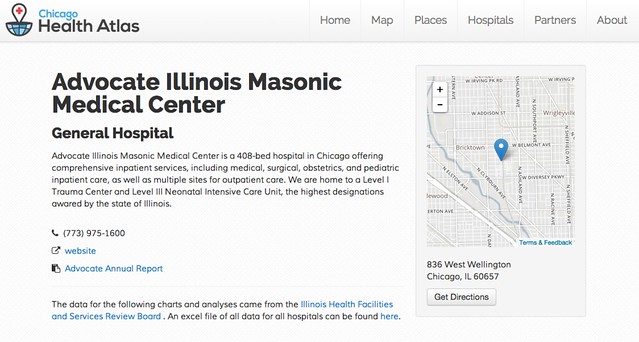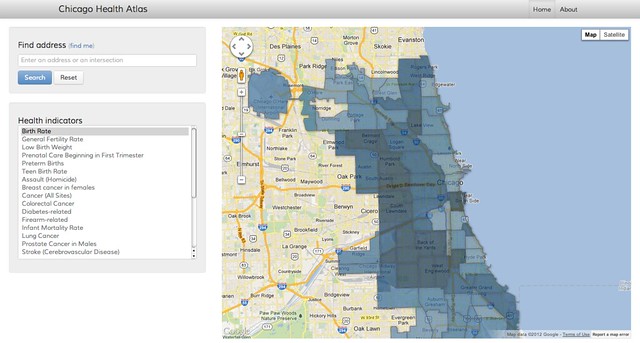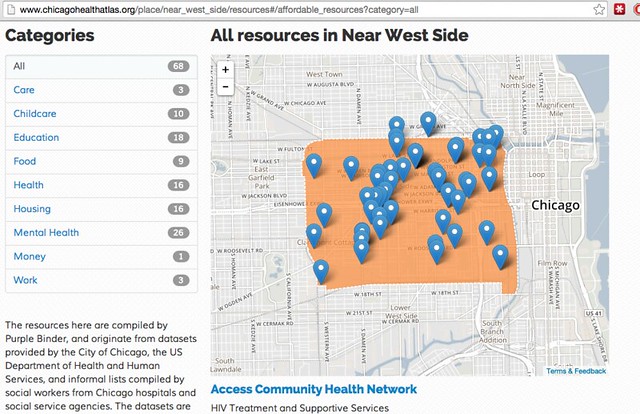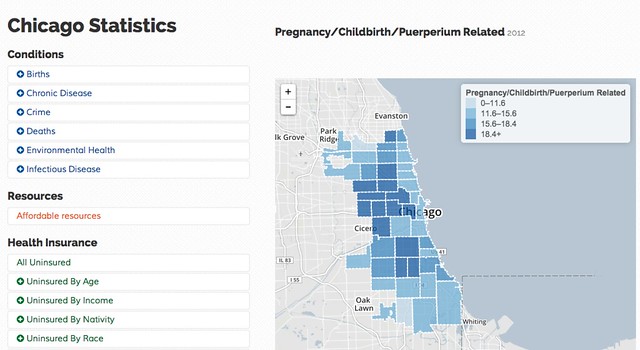Last week we launched our third major update to our Chicago Health Atlas project. This is the most robust version of the Atlas released since its debut in 2012. The Atlas is funded and receives significant thought leadership from the Otho S. A. Sprague Memorial Institute. Sprague, and their Executive Director Jim Alexander, has shepherded this program for years.
Chicago Health Atlas, along with all of our other health products like Foodborne Chicago and Smart Health Centers, is managed by Smart Chicago Director of Operations Kyla Williams with lots of help from Program Coordinator Sonja Marziano.
Chicago Health Atlas 1.0
The first version of the Atlas was a simple lookup tool for existing data. DataMade, a local firm that builds custom visualizations, deploys civic apps, and trains people to work with open data, has been an essential tech partner all the way through to this version. The site is based on the Derek Eder’s wildly influential and immensely useful Searchable Map Template. Derek was also important in helping me move from the Weave (Web-based Analysis and Visualization Environment) platform and set up a structure that met Smart Chicago’s vision for the site.
Last year we conducted a CUTgroup test on the Atlas and found that users were a little confused with the original navigation.
Version Two
After the CUTGroup test, one of the things that stuck out most clearly is that we weren’t delivering on an essential promise of the site. From the start, the site has sought to be “a place where you can view citywide information about health trends and take action near you to improve your own health”.
We did fine in delivering on the citywide info, by displaying city and state health data. But we clearly were failing when it came to showing them where they can take action near them.
We worked with civic startup Purple Binder to add community resources to the Health Atlas. Specifically, we worked with Purple Binder to build an API that could connect to the Health Atlas. (That same API is now also powering mRelief.) We had this info on the site, but it was hidden and insufficient.
Here’s some video snippets of the test:
The Atlas continues to have great growth opportunity.
New in Version Three
Hospital Pages

Part of this work involved collecting information on area hospitals and health clinics so we could display them on the site. Our IgniTech Interns helped collect this information, which was then fed into the Atlas. We mapped out all the hospitals and gave them their own detail pages. If you’re looking at the site on a mobile device, you can call the hospital directly from your that.
More Data
The Chicago Health Atlas uses data from the Chicago Data Portal, the US Census, Chicago Health Information Technology Regional Extension Center (CHITREC), the Chicago Tribune Boundary Service, Purple Binder, and several other sources. City of Chicago and Purple Binder data are downloaded directly from APIs, while others are loaded directly from saved copies in the import directory of the repository. This also means that it will be easier to add new data sets in the future.
We’ve also added data regarding hospital inpatient and outpatient by admission type that was received from the State of Illinois and separated to display just Chicago specific data. For example, here’s inpatient admission data for pregnancy/childbirth.
Rob Paral and Associates, new to the Chicago Atlas team at Smart Chicago, has been instrumental in requesting, identifying and managing very large data sets, which includes the admission and health insurance data types. We also updated the site’s demographic information and mapped out all the health care providers in Chicago.
More Documentation
In addition to the new data sets, we also created a SCHEMA.md file in our GitHub repository to help show the database structure and the methodology used to cleanup data. This will be helpful as we look for more developers to work on the Atlas project as DataMade rolls off. Additionally, links to the raw data is available in JSON and in some cases CSV. See more on our About page.
Smart Chicago is devoted to supporting our open source code as well as the larger, non-technical community of people who need health data. These nonprofits, community groups, and interested residents are our lifeblood.
More to come
If you are interested in contributing data to the Atlas, serving in an advisory capacity, or becoming our new developer on this project, please contact Kyla Williams at 312-565-2933.
We’re going to be adding more to the site in 2015, as well as conducting a series of design thinking exercises in neighborhoods around the consumption of health care. Our entire health program is poised to be of more use to more people in Chicago. Stay tuned.


